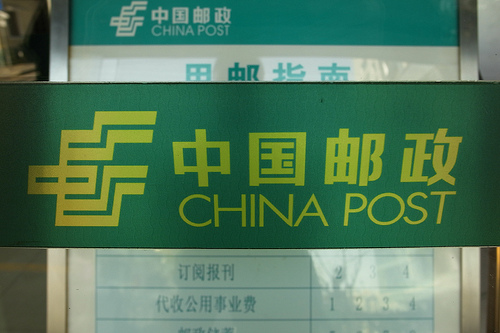Categorical Denial
by Tienchi Martin-Liao / June 20, 2012 / No comments
China’s Postal System to Ban Books from the Mail

A Post Office in Shanghai. Photo by SimonQ, Creative Commons.
The Chinese authority has sent out a notice to the post offices and customs centers in the country: “In order to further implement the mission of the ‘Campaign to wipe out pornography and stop illegal activities,’ we ask all of you to thoroughly carry out search and block duties regarding illegal publications in the course of processing and delivering the mail. Here are the guidelines: It is forbidden to mail as well as to sell publications which endanger the state’s security and social stability; the same applies to obscure books, printings, and propaganda materials and especially to books, newspapers, magazines, audio, and electronic products produced outside China, which challenge the ruling role of the CCP, defame the leaders of the party and our country, attack our socialist system, reject our reform politics…”

- During the Cultural Revolution, people were sentenced to death or outright murdered because of one wrong sentence. In China today writers do not lose their lives over their poems or articles; however, they are jailed for years. My friend Liu Xiaobo for example will stay in prison till 2020; even winning the Nobel Peace Prize could not help him. In prison those lucky enough not to be sentenced to hard labor play “blind chess” to kill time AND TO TRAIN THE BRAIN NOT TO RUST. Freedom of expression is still a luxury in China. The firewall is everywhere, yet words can fly above it and so can our thoughts. My column, like the blind chess played by prisoners, is an exercise to keep our brains from rusting and the situation in China from indifference.

- Tienchi Martin-Liao is the president of the Independent Chinese PEN Center. Previously she worked at the Institute for Asian Affairs in Hamburg, Germany, and lectured at the Ruhr-University Bochum from 1985 to 1991. She became head of the Richard-Wilhelm Research Center for Translation in 1991 until she took a job in 2001 as director of the Laogai Research Foundation (LRF) to work on human rights issues. She was at LRF until 2009. Martin-Liao has served as deputy director of the affiliated China Information Center and was responsible for updating the Laogai Handbook and working on the Black Series, autobiographies of Chinese political prisoners and other human rights books. She was elected president of the Independent Chinese PEN Center in October 2009 and has daily contact with online journalists in China.
Attached to the announcement is a list of people and publishing houses, containing many familiar names: Liu Xiaobo; Zen Jinyan, wife of AIDS activist Hu Jia; intellectuals Xu Youyu and Chen Ziming; exiled writers Liao Yiwu, poet Bei Ling, Yang Jianli, and Yu Jie; even Jasper Becker is on the list. Be aware that this is not just a list of banned books but also banned authors and publishing houses located in Hong Kong, and Taiwan, as well as one in the US and one in Germany.
Although we cannot verify the authenticity of this notice, we can look at past experience and see that recipients in China seldom receive the books their friends send from overseas. It is an open secret that such mailing lists of banned books exist and that the Chinese authority controls the postal system and treats it as an abettor to reinforce censorship. But China’s censorship can’t be enforced beyond its border, not even in Hong Kong; thus, prohibiting disturbing books from entering China is logical.
Hong Kong and Black Market Books
After the hand-over in 1997, Hong Kong developed into a stronghold for free spirits and a base for human rights. An example of this is the yearly commemoration of the Tiananmen massacre. This year at the 23rd anniversary, over 150,000 people gathered in the Victoria Park and participated in the candlelight vigil. Amazingly, many mainlander visitors to Hong Kong have started participating in the commemoration, despite the fact that Sina Weibo, a popular micro-blogging site in China, has blocked words like“64,89”, “tank”, “Tiananmen”, and even “candle.”
Mainlanders have also changed their shopping habits over the last few years. Initially only a few privileged Mainlanders came to the former British Colony to buy luxury items. Now they are more interested in books and publications that are banned in China. They smuggle books across the border where they are quickly reproduced and sold on the black market. Books about the private life of high politicians are the most popular. How many villas, Rolls Royces, concubines, and mistresses do the high cadres have? The eager readers do not care whether the sources are reliable.
The voyeurism present in a closed society, where rumors prevail over information, finds an outlet in these books. Common people’s curiosity combined with jealousy and hatred is a funny mixture. It scares the government, which fears the invisible power of words and information. Maybe the banned mailing list is meant to ease their anxiety.
What will happen to the banned books if they fall into the hands of the post and customs officers? Will they land in the trash or will they be handed over to the police like drugs? I can only guess. I’d rather believe that the confiscated books will land on the bookshelves of government servants, where they will be hastily read and handed off to the next eager reader.




